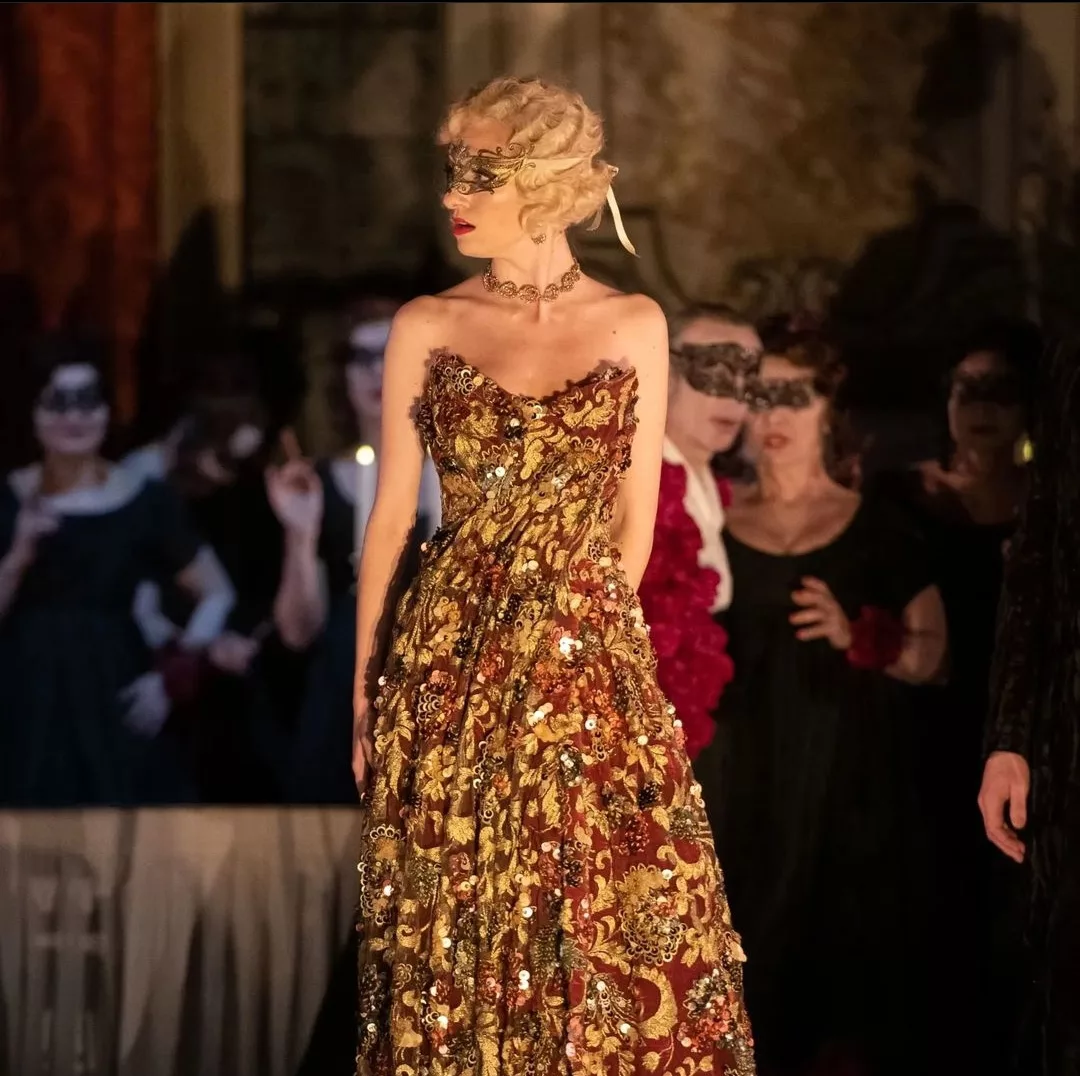
Crédit : Simon Gosselin
La Traviata at the Capitole: The heart in the voice
24/04/2023 - Olyrix - Timothé Bougon
La Traviata, Verdi’s masterpiece, is revived at the Opéra National de Toulouse in a colourful production by Pierre Rambert, conducted by Michele Spotti with a second cast led by Claudia Pavone, Julien Dran and Dario Solari.
The staging is as clear as ever, from the mundanity of Act I to the almost celestial bliss of the beginning of Act II, which is soon transformed into a descent into hell, literally: as the curtain closes on Act II, a spectre takes Violetta by the hand and leads her into the pale light that characterises the final tableau. This livid whiteness is briefly warmed by the hope given by the arrival of Alfredo before the hope of recovery is extinguished and the great white Camellia that opens and closes the work descends.
It is once again the setting for a theatrical and vocal performance by three new performer-protagonists. Claudia Pavone plays Violetta with mastery and sensitivity. Her vocal line is impeccable, very close to the text. Extremely precise in her delivery, the singer knows exactly when to concentrate her timbre, to get closer to the declamation or, on the contrary, to give it the roundness needed to perform virtuoso vocalises. Her high notes are free and well-prepared, and she also knows how to make her low notes sonorous by poitrinating them (mixing or simply switching from the head mechanism, typical of the aesthetics of female operatic voices, to the chest mechanism, closer to the spoken register).
Her mastery of the voice is matched by a musical and theatrical sensitivity that naturally embraces the text and nuances of the score. While Act I is marked by impressive forte (and a high-pitched cadenza that has already earned her widespread applause), she displays fine, touching piani in the following acts, and the passage in Act II when she is torn by the promise to leave Alfredo is disconcertingly ingenuous. Her theatrical addresses are precise, the emotion sincerely conveyed and rising from act to act to the touching pianos charged with intensity. This outstanding performance was greeted with a standing ovation from the audience.
Julien Dran lends his lyrical, generous tenor to Alfredo. With his ease and obvious freedom on stage, he is dynamic in his acting, more physical in his interactions with Violetta (than the previous cast). The voice is beautiful, warm and vibrant, the fullness of his lyrical timbre making the text sometimes unevenly intelligible but clear overall. His performances are very wide-ranging, and can sometimes lack the relief of finer nuances or more declamatory lines, as he knows how to offer in his piani in the last act, embracing the nuances and emotion of the moment.
Dario Solari plays the father figure of Giorgio with his imposing baritone voice. His timbre is rich in harmonics and easily passes the orchestra, which is broad but sufficiently concentrated not to be heavy and to keep the text completely intelligible. His timbre is rich in harmonics and easily passes the orchestra, broad but focused enough not to be heavy and to keep the text completely intelligible. He finds a variety of colours just right in his duet with Alfredo, but his tone somewhat dominates the very fine nuances offered by Claudia Pavone. Gifted with a marked stage presence, his theatrical addresses can sometimes lack precision.
The supporting roles are recurring in both casts. Victoire Bunel is still the sultry and charming Flora, her warm voice matching the enchanting dimension of her character. Cécile Galois lends herself to the role of Annina, always sustaining the emotional intensity of the action with her precise diction and delivery. Pierre-Emmanuel Roubet is an even more assured, dynamic and explosive Gastone than at the premiere, literally jumping up and down on the table in Act II, at ease on stage and in his role. The serious Baron Douphol is well embodied by Jean-Luc Ballestra, whose voice is strong, beautiful and well placed. Guilhem Worms gives body to the Marquis d’Obigny with his well-projected bass voice. Finally, Sulkhan Jaiani maintains his spirit of sincere simplicity in his role as Doctor Grenvil, underpinning the emotional intensity of Act III with his warm bass voice.
Dancers Natasha Henry and François Auger play the mute roles of the spectres, key players in this stylised staging, and offer a frenzied performance during the matadors’ chorus.
The Orchestre National du Capitole is conducted by Michele Spotti, always smiling, enthusiastic and dynamic. He took advantage of the more sonorous voices of the evening’s soloists to play up the score’s forte even more, the orchestral sound being precise and warm, of an even and irreproachable quality.
The Chœur du Capitole, prepared by Gabriel Bourgoin, was also even more impressive than the previous evening, in the comfort of a lyrical vocality particularly well-suited to this music by Verdi.
This second cast made a lasting impression with the vocality of the main trio and left a lasting impression with the vocal and stage performance of its Prima Donna. Paradoxically, while this second cast of Alfredo and Giorgio Germont is more lyrical and irreproachable in terms of vocal line and technical skill, it does not create the same touching chemistry between the three protagonists. It is for Violetta that almost the entire Capitole audience rises to its feet, to salute and acclaim the memorable performance of a singer with her heart in her voice.